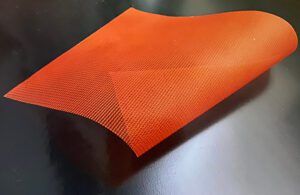
Ariste Medical’s polypropylene hernia mesh [Image courtesy of Ariste Medical]
Ariste Medical recently won FDA 510(k) clearance for its drug-embedded, polypropylene hernia mesh to fight microbial colonization.
The Salt Lake City-based drug-device developer said the patents and proprietary formulations behind the technology could prevent infection, inflammation or clotting associated with implants.
Ariste’s synthetic mesh carries two antibiotics — minocycline and rifampin — to prevent contamination by MRSA, E. coli and other bacterial pathogens associated with surgical site infections. The proprietary formulation can be applied to a variety of medical devices and incorporate any drug to address infection, restenosis, thrombosis and inflammation, the company said.

Ariste Medical co-founder and Chief Scientific Officer Lisa Jennings [Photo courtesy of Ariste Medical]
“Our patented, novel technology serves as a platform for mitigating failure of other implants due to bacteria burden,” Ariste co-founder and Chief Scientific Officer Lisa Jennings said in a news release yesterday.
Ventral hernia repair is a good place to start. It’s one of the most common surgeries in the U.S., with more than 400,000 procedures per year and mesh-related infection rates ranging from 8-40%, Ariste said.
“Infection following open hernia repair continues to be a challenge that leads to a vicious cycle of reoperations, negatively impacting patients’ quality of life, and increasing the economic burden of health care and driving up costs for health systems,” Dr. Michael Rosen, an Ariste board member who’s also director of the Cleveland Clinic Center for Abdominal Core Health, said in the news release.
Founded in 2007, the pre-commercial company said it has developed similar approaches for vascular grafts and catheters. Read more about the technology in this Medical Design & Outsourcing interview with Jennings from 2016.